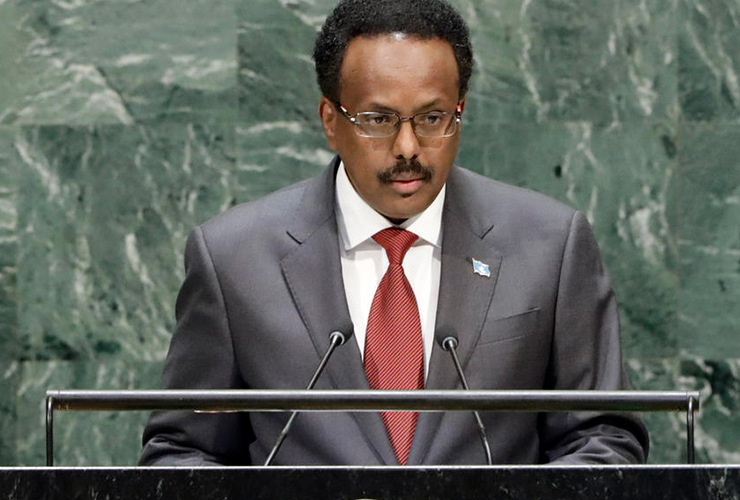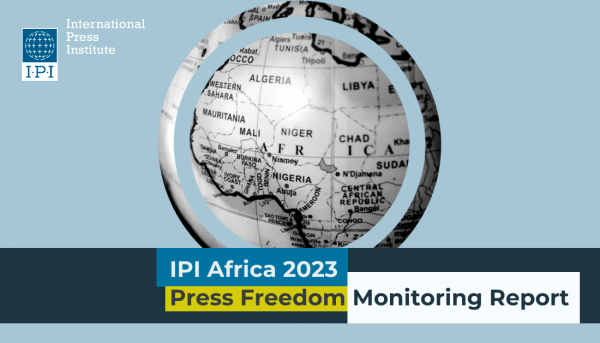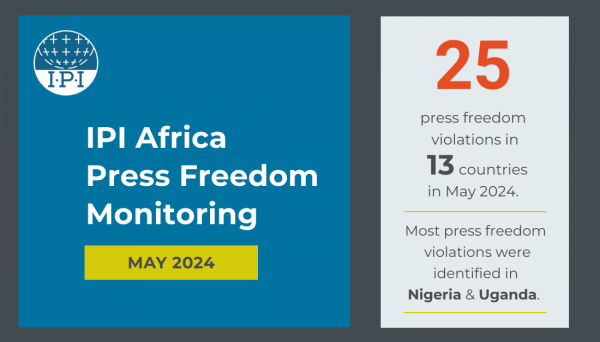The International Press Institute (IPI), a global network of editors, media executives and leading journalists for press freedom, has urged Somalia President Mohamed Abdullahi Mohamed to take immediate steps to end the harassment of journalists and media outlets.
In letters sent to the president last week, IPI expressed serious concern over the rapidly deteriorating state of press freedom and frequent harassment of journalists by the national intelligence and other government officials.
“Democracy will not be able to flourish in Somalia without an independent media”, IPI Director of Advocacy Ravi R. Prasad said in the letter. “Media pluralism too is an essential element of a democracy, especially at a time when the country is faced with arduous challenges.”
IPI urged the president to ensure that the National Intelligent Security Agency and other government officials stop arresting, harassing and intimidating independent journalists and media outlets in the country ahead of the parliamentary elections expected to be held this year.
Read the full text of the letter to the president here:
—
His Excellency Mohamed Abdullahi Mohamed
President
Republic of Somalia
30 April 2020
Your Excellency,
The rapidly deteriorating state of press freedom and rampant harassment of journalists in Somalia has become a matter of serious concern for the members of the International Press Institute (IPI), a global network of editors, media executives and leading journalists.
According to the information gathered by IPI, nine journalists have been arrested and a number of media outlets closed down in the first four months of 2020, delivering a severe blow to freedom of expression and press freedom in the country ahead of the parliamentary elections this year.
It is extremely disconcerting that journalists are detained without charge, security forces are intimidating reporters and government officials are forcing some journalists to withdraw critical reports and closing down media outlets others for whimsical reasons.
A glaring example of arbitrary detention is the case of Mohamed Abduwahaab Nuur, editor of the Mogadishu-based independent Radio Higsi. He has been in the held in detention by the National Intelligence and Security Agency (NISA) since March 7. Nuur was arrested on February 29, three days after writing an article about the brutality of Somali security forces, and released on March 2, only to be rearrested. Although no charges have been filed against him, the Ministry of Information has accused Nuur of being a member of a terror group, without providing any evidence. The journalist has not been allowed to meet his family or lawyer.
Several other journalists have been detained and released by NISA. Voice of America (VOA) correspondent Mukhtar Mohamed Atosh was arrested by NISA on April 20 and detained for two days, after reporting the death of a 14-years-old rape victim. It appears that NISA is targeting VOA journalists in particular, as the agency announced on April 23, that it had asked the Attorney General to frame charges against another VOA journalist Harun Maruf, accusing him of being a “threat to national security”.
Four journalists working for Goobjoog News were also briefly detained by NISA on March 29, while covering a story on persons with special needs. They were released three hours later without any charge.
Assaults on media persons by security forces have also increased at an alarming rate. Most recently, on April 19, Somali police assaulted three journalists of the Shabelle Media Network while they were returning from an assignment.
On April 20, authorities ordered the closure of Radio Barawe, a community radio station broadcasting in Baravanese dialect, in Barawe town in Lower Shabelle region, on the pretext that the dialect was not recognized by the government and therefore it was illegal to use it for broadcasting news and entertainment programmes.
In another bid to censor reports, officials asked Mohamed Dhaysane, a journalist working for Turkey’s national news agency Anadolu, to retract his report based on the government’s announcement that it would send 20 doctors to Italy to help fight the COVID-19 pandemic.
Your Excellency, these acts of intimidation, censorship and arrests of journalists perpetrated by officials of your government are creating a climate of fear and forcing many of them to practice self-censorship.
Under your leadership, Somalia is preparing to hold its first parliamentary elections in decades, which will be a significant milestone in establishing democracy in the country. However, democracy will not be able to flourish in Somalia without an independent media. Media pluralism too is an essential element of a democracy, especially at a time when the country is faced with arduous challenges.
We, therefore, urge you to take immediate steps to stop the intimidation and arbitrary arrests of journalists by the security forces and the unjustifiable closure of media outlets, and ensure the strengthening of an independent media that would help build a democratic Somalia.



